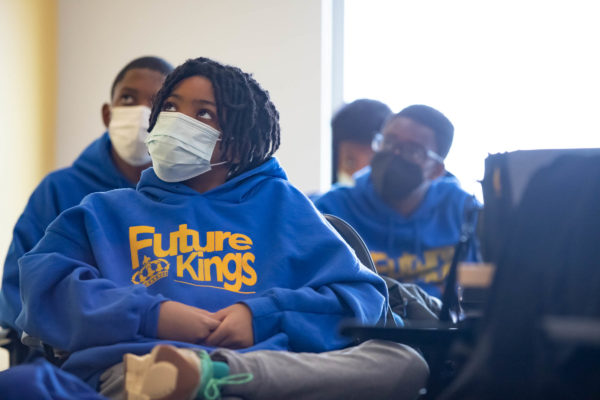
This editorial article is a part of Tech Education Month 2022 of Technical.ly's editorial calendar. This month’s theme is underwritten by Verizon 5G. This story was independently reported and not reviewed by Verizon before publication.
Manassas, Virginia after-school program and summer camp Future Kings doesn’t just see building a local tech talent pipeline as support of the region’s top students. That work also requires reaching back to those “hidden geniuses” that might be overlooked.
Future Kings has hosted year-round programming since 2010 but added summer camps in 2016. Despite the name, the program also includes girls in its summer camps, although this is the first year it’s had enough participants for a girls-only group. The multi-year program is available for Virginia students of color from 6th grade up through high school from underserved communities. It typically conducts recruitments for the “hidden geniuses” or students who have shown potential but might not be at the top of the class.
Founder and executive director Arik King told Technical.ly that in various K-12 environments, students who are motivated and intelligent but don’t necessarily have straight As can be overlooked.
“We try to connect those students with a network and technical training and 21st-century skills training that helps them move from good to great and prepares them for life after high school,” King said. “We want to give them a competitive advantage over their peers regardless of whether they were average students to begin with.”
With the summer camps, King said that the organization can present what Future Kings does to others in the community and encourage more involvement. About 45 students complete the programming every year, King said, though it usually starts with more. Students can take part in curricula (which follow CompTIA material) in cybersecurity, computer game design, drone engineering, biomedical and the newly added AI and data science program. With the students, Future King tries to blend work and “21st-century” skills alongside technical skills to ensure students’ success. Many program participants have gone on to be STEM majors at schools like Yale University, Johns Hopkins, George Mason University and more.
“We think it has to go beyond just technology; If they own and know their technology but don’t have workplace skills, then they could be lost,” King said.
As the program heads into its second decade, King hopes to scale it and add new locations to reach more students. But he noted that the program could specifically benefit from more outreach and hands-on project collaboration from local companies and nonprofits, which could help build a greater community.
“Working with those advanced organizations in a real-world, practical project is something that benefits our participants in cyber,” King said. “So the more of those things we can do, the better influence we can have in the community.”
Tshaka Cunningham, Future King’s program leader in biotechnology, said that as the program grows, he hopes to get more local companies involved with the program’s students. Many program participants have interned at his own company, Polaris Genomics, and the advanced students sometimes even have more skills that the undergraduate interns.
Building a pipeline for technologists of color includes giving students real-world opportunities and practical experience, he added.
“I’m really a big fan of these kinds of programs because they don’t always get the fanfare, but they really have the boots-on-the-ground effect that will lead to the change we want to see over time,” Cunningham said.
Join the conversation!
Find news, events, jobs and people who share your interests on Technical.ly's open community Slack

DC daily roundup: Inside UMCP's new ethical AI project; HBCU founder excellence; a big VC shutters MoCo office

DC daily roundup: Esports at Maryland rec center; High schoolers' brain algorithm; Power data centers with coal?

DC daily roundup: Tyto Athene's cross-DMV deal; Spirit owner sells to Accenture; meet 2GI's new cohort


